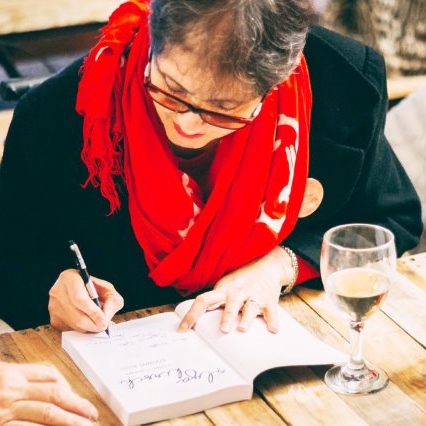
News

Recalling the sole Jewish voice in Afrikaans poetry
MOIRA SCHNEIDER
Kirsch is the sole Jewish voice in Afrikaans poetry, but the Jewish community has never really claimed her as one of its own, said Dr Egonne Roth. She was giving a talk on Kirsch’s life and poetry, held under the auspices of the South African Jewish Museum and the Kaplan Centre for Jewish Studies at the University of Cape Town on 13 September.
Roth has released a biography, Olga Kirsch: a life in poetry , to ensure that the poet is not forgotten, and to show why her work is important in South Africa and Israel.
Roth investigates Kirsch’s role as an Afrikaans Jewish poet, and presents her as an example of a cross-cultural, multilingual, immigrant poet. Roth, who was affiliated to the department of English of Bar-Ilan University, holds a PhD from the institution.
Kirsch was the child of immigrant parents. Her father came from Plunge, Lithuania, settling in Koppies, Free State, in 1915. Olga was born there in 1924.
She attended the Afrikaans-medium elementary school in Koppies, but her father sent her to Eunice Girls’ High School in Bloemfontein because she wanted to study Latin. She also had romantic notions of hostel life from the English books that she had read.
After matriculating in 1941, the family moved to Johannesburg, where Olga enrolled in the medical faculty at the University of the Witwatersrand. This didn’t work out, so she switched to Afrikaans and history.
Before she graduated with her first degree at the age of 20, she became the second woman to publish a collection of poetry in Afrikaans, titled Die Soeklig.
Her second collection, Mure van die Hart (1948), “confirmed her place in Afrikaans literature”, Roth said. “It clearly positions her as a Jewish poet, and brings her into conflict with the growing nationalism of the day.
“She took an outspoken, dynamic stand as a Jew” against the backdrop of the Ossewabrandwag, her brothers having been beaten up, and her father having had swastikas daubed on his shop.
One of the Jewish poems in the collection, Die Wandelende Jood, reads in part:
“G-d condemned his people to the fire,
Machine guns, gas chambers and the grave.
He gathered them into church and barn
And with white lime and the flame punished them.”
“Considering how little literature about the Holocaust was being published in 1948 anywhere in the world, this poem with its clear descriptions of what happened was truly unique,” said Roth.
The last three poems in the collection were “brave”, she said, in that they clearly stated Kirsch’s position on rising Afrikaner nationalism. Referring to another poem, Blockhouse, which contains the line, “hate closed the doors one and all”, Roth said, “Already in 1947/8, Kirsch saw clearly how people create an us/they scenario.
“This is for me the relevance of her writing. Many artists, but I think especially poets, often fulfil the role of a prophet, just as our Hebrew prophets were also poets.”
At the end of 1948, Kirsch emigrated alone to Israel “driven by her desire to help her people become a people, and build a country in their historic homeland”, in Roth’s words. After spending three months at Kibbutz Ma’ayan Baruch, she met and married Dr Joseph Gillis, and settled in Rehovot.
In 1967, Kirsch published part of a long, epic poem, Nevertheless, in a Jewish journal in New York. The complete work, described by Roth as “an unknown jewel in the treasure of Holocaust literature”, is published in the biography for the first time.
“Once Olga’s younger sister, Janette, had given me this long poem… I knew I had no choice but to research and write this biography,” she recalls. “I felt it had to be restored to Holocaust and Jewish literature.
“Once again, Kirsch’s ability to express, not just the personal, but also the universal, giving voice to not just the history of Israel, but also foreshadowing the future, is astounding,” says Roth. Kirsch also wrote poetry in Hebrew.
Between 1972 and 1983, Kirsch published a further five collections in Afrikaans, in many of which her Jewish voice is clear, according to Roth. But in 1983, after her last collection received “solidly bad reviews”, she accepted that she could not continue to write in Afrikaans, and that it was perhaps time to “come out of the closet” with her English poems.
Death was a recurring theme in her work, beginning with the death of her father just after her thirteenth birthday. After the unexpected death of her husband in 1994, Roth says Kirsch wrote “a cycle of some of the most beautiful elegiac poetry I have read”.
“Olga was devastated, and never fully recovered.” She died three years later, but in the interim had written 77 poems to him – “beautiful, sad, sometimes erotic poems that reflect on every aspect of their glorious relationship”.




